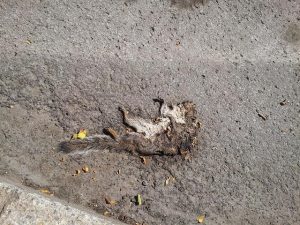
There are numerous diseases that can still infect us through dead animals, and the growth of bacteria on the dead animal can also have ill effects on our health. Then we must consider any parasites that use to feed from the dead animal that is now looking for a new host and could be carrying a host of other diseases.
So, if you happen to smell something in your house or come across a dead animal in your yard, please do not attempt to discard of it on your own. Call someone who knows the proper precautions needed and save yourself a lot of heartache. Here is just a few of the diseases you could be saving yourself from contracting.
- Many of us are afraid to touch dead animals because of the risk of rabies. However, when you fully understand the rabies virus, you will know that while there may be a risk involved it is very little. The rabies virus does not survive long when it is exposed to open air. This virus will only survive as long as the animal’s saliva does not dry up, so once the saliva is gone so too is the rabies virus. This means that the animal will have to be newly deceased and the remaining infected saliva will have to work its way through an opening in your skin, which is possible but highly unlikely.
- This disease on the other hand is a greater concern. Anthrax is caused by the bacterium Bacillus anthracis and can be transmitted to humans and our pets. It can be fatal, and dead animals that are infected with it are still contagious after death. The spores from the bacteria have a long lifespan and have been known to remain around the dead animal’s burial site for decades. In fact, there have been reports of some burial sites infected with anthrax being disturbed and infecting people after 70 years. There are ways to prevent anthrax outbreaks such as vaccines, and if you are infected, you will want to be treated as soon as possible with antibiotics to increase your chance of survival.
- Tularemia is another bacterial disease that can be spread through dead animals. People can breathe in, touch or even eat these spores without even knowing. Some people will remain unaffected by this bacteria, while others will become very sick or die. After being exposed to tularemia, most people will typically become ill in 3 to 5 days, though the range can be anywhere from 1 to 14 days. You may have a high fever, pink eye, headaches, stomach pain, intestinal distress, chest pains, cough, sore throat and swollen glands. If you think that you may have fallen ill because of this bacteria, you need to seek the help of a doctor immediately. Tularemia pneumonia is more dangerous than other forms of the disease, so you should seek treatment prior to showing any symptoms.
- Dead animals can be hosts to many different parasites such as mites, fleas or ticks. These mites, fleas and ticks will be looking for new hosts, and they will not discriminate. They could attach to you or your pets and spread other diseases like lyme disease, typhus, scabies, lice and even the bubonic plague. These diseases can be serious and can have some ill effects on our overall health and well-being. The bubonic plague is known as one of the worst epidemics in our history, so why take the chance of contracting this deadly disease?
There are many things you need to consider before you decide to dispose of any dead animal. There are many diseases we could still catch from them, and we need to know the proper ways to handle the dead animal in order to lower our risk of infection. We will also need to know how to properly clean and sanitize the area the animal was found in to ensure that the area is not infected with bacterial spores and other germs. It is important to know what type of diseases each animal may carry to ensure that you are taking all the necessary precautions. So, the best bet is to call in someone who is certified in handling dead animals to remove and sanitize the area for you.

